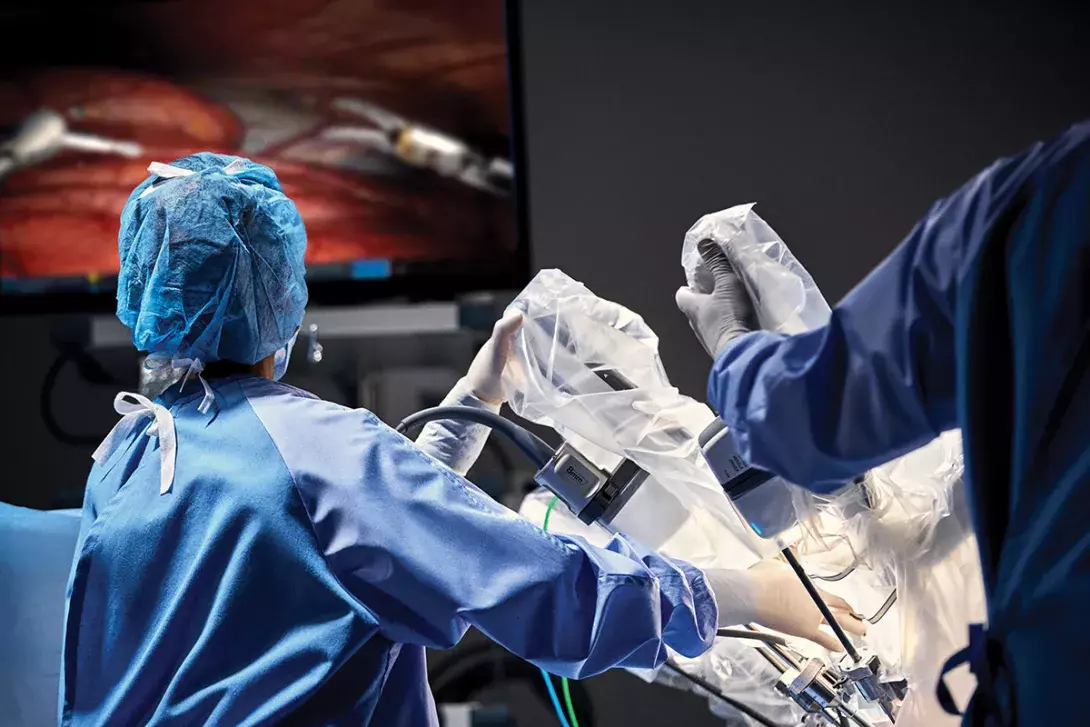Head and neck robotic surgery
The Head & Neck Robotics course is designed for surgeons aiming to specialize in cutting-edge Head and neck robotic techniques. Robotic surgery is the most advanced form of minimally invasive surgery. Robotic surgery has been rapidly adopted by hospitals globally for use in the treatment of a wide range of conditions. This course provides surgeons knowledge on Robotic surgery setup using the Intuitive da Vinci Surgical System which is the most advanced minimally invasive surgical platform available.
Offline
2 Days
Head &neck surgeons , ENT Surgeons and PG students, oncologist
About courses
- Understand surgical techniques for safe and effective robotic surgery
- Calibrate and troubleshoot robotic system setup
- Apply appropriate retractor settings and port placements
- Demonstrate effective communication and collaboration skills
- During this program, your experience will include
- Exposure to discussions on robotic technology, human factors and surgical evaluation tools
- Robotic surgical platform training
- Hands-on simulation, dry lab experiences
- Skill drill exercises
- Surgical case observation
- Development of competencies and skills to safely operate the Intuitive Surgical DaVinci Robot
- Defining the robotic surgical platform, its features, setup and organizational requirements and troubleshooting measures.
- Developing the psychomotor skills required to safely operate the da Vinci robotic surgical platform.
- Leveraging surgical case observation in defining how the robotic surgical platform is integrated into the operating room.
- How the platform can be best utilized in clinical practice.
- Developing clinical efficiency through comprehensive team training.
- Guidance for Equivalency training.
- Fellowship opportunity.
Course Director & Faculty

Dr (Prof) U S Vishal Rao
Course DirectorGroup Director - Head and Neck Surgical, Oncology & Robotic Surgery, HCG Hospitals, Bangalore, HealthCare Global (HCG) Cancer Centre

Dr. Shalini Thakur
Course FacultyAssociate Consultant, Department of Head & Neck Surgical Oncology, HCG Hospital
Course Curriculum
01 Module 1 - Introduction to Robotic Program
Fundamentals of Robotic Surgery (FRS)
Human Factors: Situational Awareness in robotic Operation Theatre
Human Factors: Errors & Violations
Dry lab (skill development model)
Retractor setting on Mannequin
Simulation Skill Development
02 Module 2 - Robot set-up
Patient positioning & Retractor setting
Robotic docking sequence
Surgical procedure setup & facilitation
Surgical teams' role & responsibilities
Human Factors: Team dynamics
03 Module 3 - Technical skills development
Team Training Workshop
Simulation Team Training
Briefing & Debriefing
Communication Skill Development
04 Module 4 - Non-Technical Skills development
Start up and calibration
Docking sequence, Instrumentation
Types of retractors and retractor setting
Patient cart positioning, port placement
05 Module 5 - Hand's on Practice Sessions
Patient positioning & Retractor setting
Robotic docking sequence
Surgical procedure setup & facilitation
Surgical teams' role & responsibilities
Human Factors: Team dynamics
06 Assessment
Theoretical knowledge
Technical Skills test
FREQUENTLY ASKED QUESTIONS
01 Which robotic surgery courses are offered by GHA?
GHA offers separate robotic surgery courses in GI Surgery, Uro-Oncology, Gynaecology, and Head & Neck Surgery.
02 Who can attend these courses?
Surgeons, fellows, and consultants from the respective specialty of the selected course.
03 Is the course hands-on?
Yes. Each course includes simulation-based hands-on training and live case observership relevant to that specialty.
04 Do I need prior robotic experience?
No. Courses begin with robotic fundamentals before advancing to specialty workflows.
05 Are non-technical skills covered?
Yes. Focus on communication, situational awareness, team coordination, and safety.
06 Will I observe live robotic surgeries?
Yes. Live robotic case observership is included for the respective specialty course.
07 Does the course address complications and errors?
Yes. Covers error recognition, complication prevention, and safe robotic practices.
08 Is this useful for starting a robotic program?
This is a foundational course. It helps participants understand robotic OR setup, workflow, and team roles, advanced training is required for independent practice.
09 Will I receive a certificate?
Yes. Participants receive a joint certificate from Global Healthcare Academy (GHA) and Intuitive
10 What if I need help during the course?
Continuous faculty supervision, on-site mentors, and GHA academic support are available.
11 What is the refund policy?
- Full refund (excluding taxes) for cancellations made more than 30 days before the course start date.
- No refund for cancellations made within 7 days of the course start date.
- Seat transfer or batch adjustment may be considered only in exceptional cases, subject to approval.
12 Who conducts the training?
Experienced specialty-specific robotic surgeons from intuitive, supported by GHA’s academic team.
13 How do I register or get details?
📞 +91 85959 26808
📧 info@globalhealthcareacademy.in
🌐 www.globalhealthcareacademy.in


